Key takeaways:
- Author branding involves creating a cohesive identity through personal experiences and understanding your audience to foster deeper connections with readers.
- A strong brand enhances recognition, trust, market differentiation, and reader engagement, ultimately leading to a more successful writing career.
- Engagement with your audience through authentic interactions and feedback can transform casual readers into loyal fans and create a supportive community.
- Utilizing social media strategically can refine your work and expand your reach, making it essential for building an effective author brand.
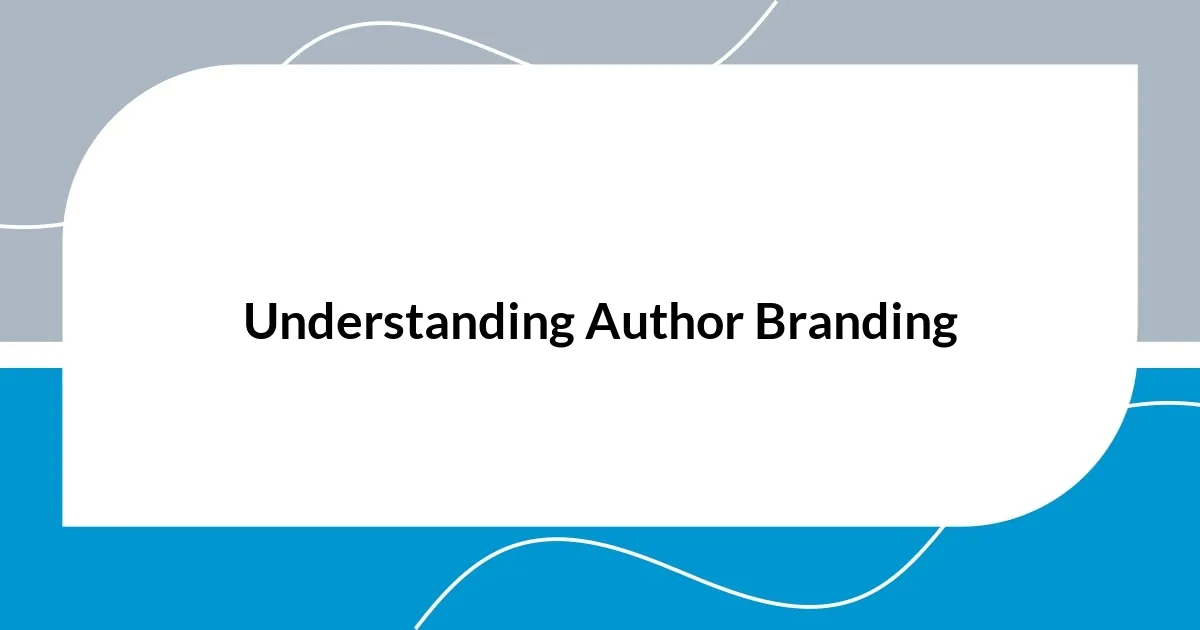
Understanding Author Branding
Author branding is more than just having neat covers and catchy titles; it’s about creating a cohesive identity that resonates with readers. I remember when I first started my writing journey, I struggled to define what set me apart. It led me to ponder: What story do I want my readers to tell about me? This reflection sparked the recognition that my voice and values must shine through every word I publish.
Building an author brand means weaving your personal experiences and beliefs into your work. For instance, I often draw on my love for nature and the lessons it teaches me, hoping to connect deeply with readers who share that passion. It’s a powerful realization to understand that my life experiences can craft a narrative that feels genuine and engaging, fostering a bond with my audience that goes beyond the pages.
Recognizing your audience is a critical aspect of author branding. I often ask myself: Who am I writing for? Understanding my readers’ preferences shapes my writing style and topics. This connection transforms casual readers into loyal fans, eager to follow my journey and explore the world I create with each new book. It’s exhilarating to see how a clear author brand can turn a single book into a lifelong relationship with my audience.
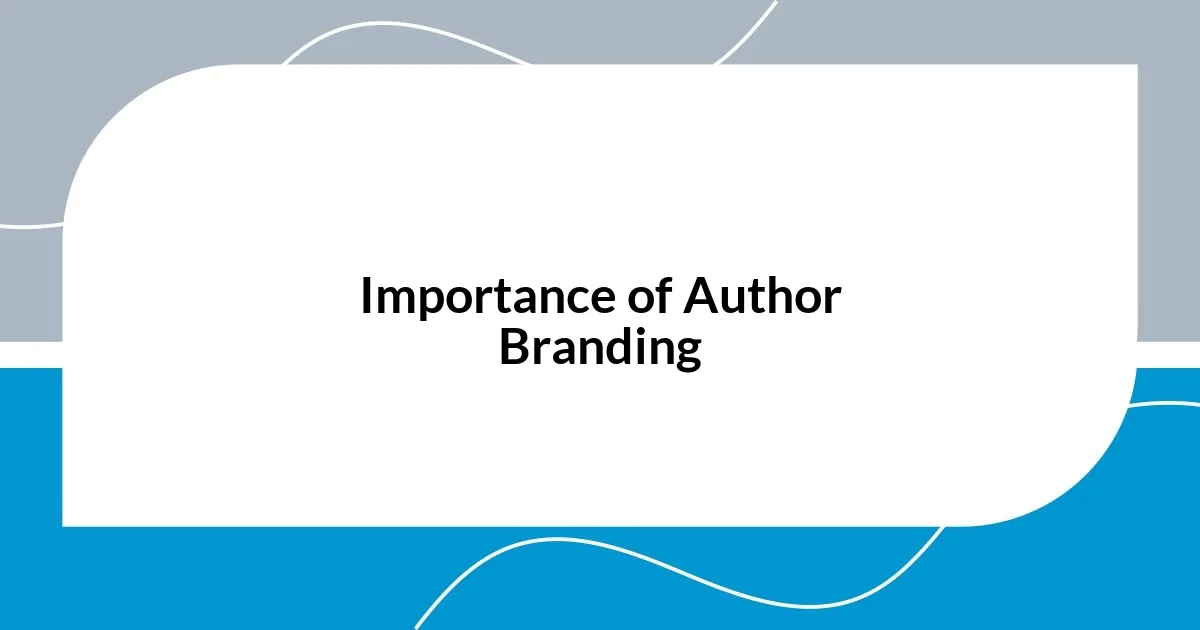
Importance of Author Branding
Establishing a solid author brand is pivotal in today’s crowded literary landscape. I vividly recall the moment I received feedback from a reader who mentioned feeling like they truly knew me through my writing. That connection reinforced just how vital it is to present a consistent and authentic identity. An author brand becomes the lens through which readers interpret your work, encouraging them to invest not just in your stories, but in you as a person.
Consider these key reasons why author branding is essential:
- Recognition: A strong brand makes you memorable in the minds of readers, increasing their likelihood of picking up your next book.
- Trust: When readers recognize and resonate with your brand, they develop trust, which can translate to loyalty and advocacy.
- Market Differentiation: In a sea of voices, a unique brand helps you stand out, showcasing your personality and perspective.
- Expanded Opportunities: A well-defined brand can lead to speaking engagements, collaborations, or even opportunities outside of writing.
- Reader Engagement: A compelling brand invites readers into your world, creating a community around your narratives and ideas.
Each of these points underscores the profound impact that thoughtful author branding can have on your writing career, not just as a marketing tool but as a means to forge lasting relationships with readers.
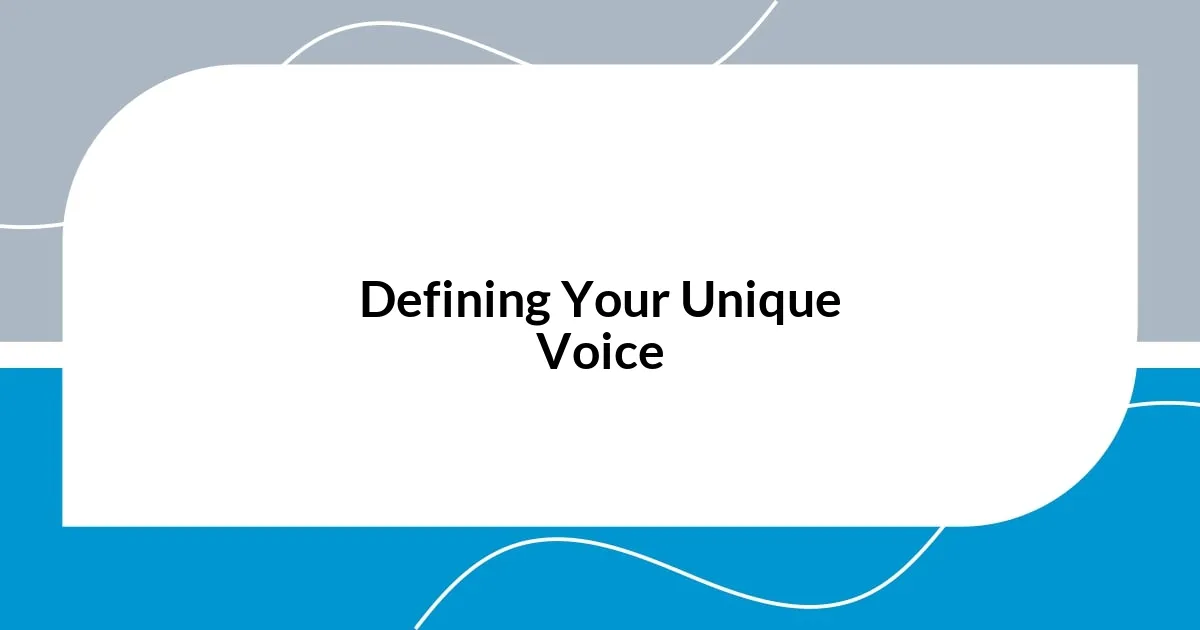
Defining Your Unique Voice
Defining your unique voice is an essential step in author branding that can set you apart in a crowded market. I remember tinkering with my writing style, experimenting with different genres and tones. Each attempt taught me something valuable about what resonates with my authentic self and, in turn, connects with readers. Coming to terms with my voice felt like unearthing a hidden treasure; it was always there, but I needed to dig deep to understand it.
Finding your voice is about more than just word choice; it’s about embracing your personality and experiences. For instance, I find joy in incorporating humor into my narratives, which reflects my own outlook on life. When I made that realization, my writing transformed. It became not just a story but an extension of who I am, making it easier for readers to relate and connect with the characters that mirrored my quirks and traits.
Furthermore, identifying your unique voice involves knowing who you are as a storyteller. I often engage in self-reflection, asking questions like: What themes do I feel passionately about? How do my life’s ups and downs shape my perspective? This inquiry isn’t a one-time act; it’s an ongoing journey that helps refine my voice continually. Each step I take reaffirms my brand while inviting readers into a world that feels distinctly mine.
| Aspect | Description |
|---|---|
| Personal Touch | Integrating your personal stories makes your voice relatable and genuine. |
| Consistent Tone | Establishing a consistent tone creates familiarity, enhancing reader loyalty. |
| Theme Exploration | Diving deep into specific themes allows your voice to resonate profoundly with your audience. |
| Self-Reflection | Regularly asking yourself what matters helps evolve your voice and keeps it authentic. |
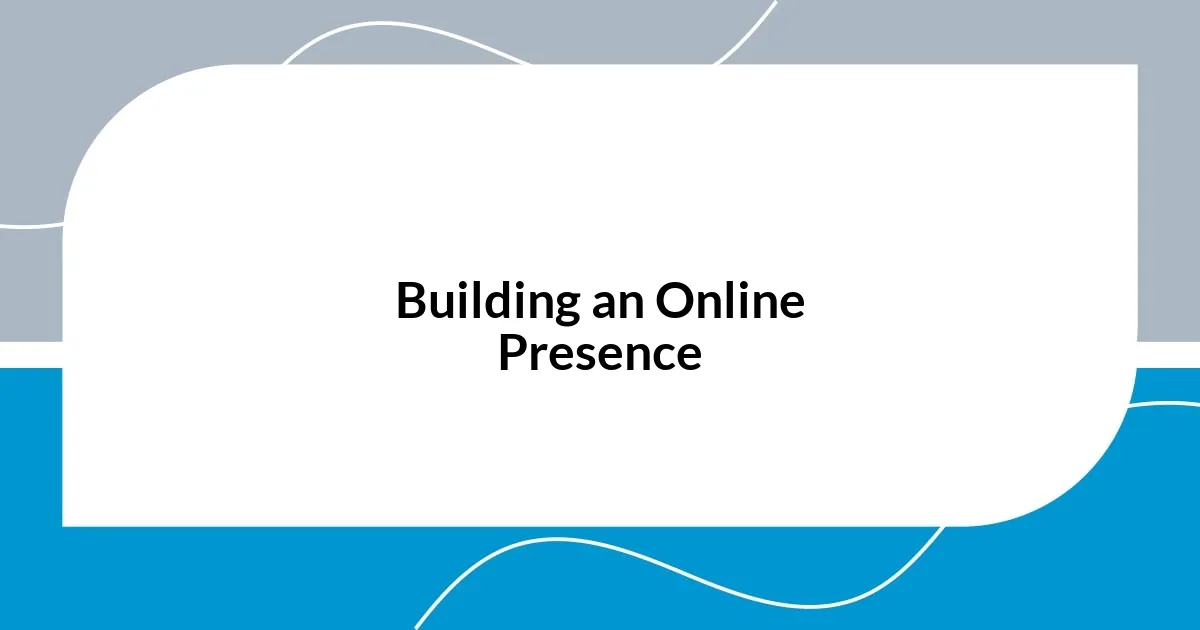
Building an Online Presence
Building an online presence is vital for any aspiring author. I remember the early days of my writing journey when I hesitated to share my work on social media. However, once I took that leap, I discovered a supportive community of fellow writers and readers who genuinely engaged with my content. It made me realize that an online presence isn’t just about visibility; it’s about creating relationships that deepen the connection between you and your audience.
When it comes to establishing that presence, consistency is key. I’ve found that posting regularly on various platforms—whether it’s snippets of my writing, personal musings, or insights into my creative process—helps keep my audience engaged. Have you ever thought about the impact of regular updates on your readers? Each time I share something new, I see familiar names in the comments, which reinforces the idea that I’m nurturing a community that’s eager to follow my journey.
Don’t underestimate the power of authenticity in your online interactions. I often share both my successes and struggles, allowing readers to see the real me. Just the other day, a reader reached out to express how my vulnerability inspired them to embrace their own creative path. This kind of genuine engagement fosters trust and loyalty, transforming a simple online presence into a vibrant, interactive space where storytelling and connection flourish.
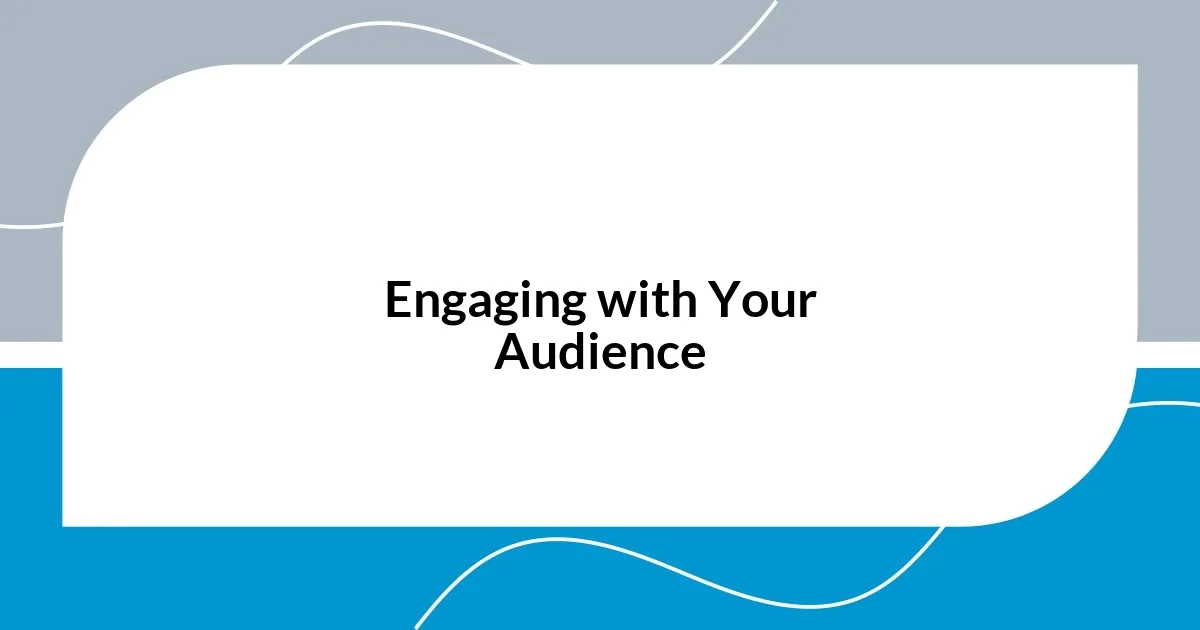
Engaging with Your Audience
Engaging with your audience is about forging authentic connections. I recall a time when I hosted a live Q&A session on social media, brimming with excitement yet a touch nervousness. The questions poured in, and I realized how much readers appreciate a chance to voice their thoughts and curiosities. It was refreshing to interact with them directly, allowing me to understand their perspectives and preferences better. Have you ever opened yourself up to your audience in such a way? That opportunity to converse made my writing feel more relevant and alive.
Another aspect of engagement is storytelling—sharing relatable experiences creates a bond. I once wrote a blog post about a particularly challenging moment in my writing journey, and to my surprise, I received an outpouring of responses. Readers shared their struggles, too, which made my vulnerability resonate deeply with them. I genuinely believe that moments of openness pave the way for richer conversations and deeper connections. By inviting readers into my world, I found that we bonded over shared experiences rather than just the stories on the page.
Lastly, I find it valuable to ask for feedback from my audience. It’s not just about presenting my work; it’s about growing together. When I put out a survey asking for input on my next project, I was met with enthusiastic responses that not only shaped the direction of my writing but made my readers feel valued. Isn’t it amazing how a simple question can turn passive readers into active participants? Engaging with your audience isn’t merely a tactic; it enriches your creative journey, making the process more collaborative and fulfilling.
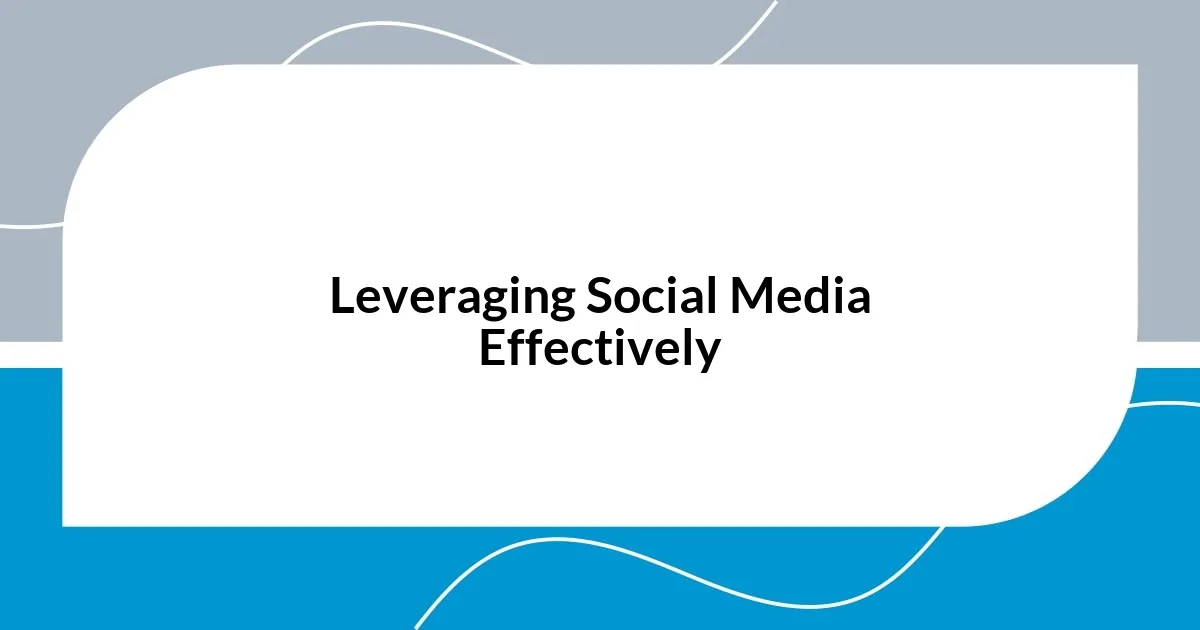
Leveraging Social Media Effectively
Social media can be a powerful tool for authors when used strategically. I remember a time when I decided to share an excerpt from my latest project on Instagram. The instant feedback, from enthusiastic comments to even constructive criticism, opened my eyes to the importance of using these platforms not just as promotional tools, but as a way to refine my work through community insight. Have you ever felt that rush of connection when your words resonate with someone? It’s exhilarating.
Navigating different social media platforms is like choosing the right venue for an event—each space offers unique opportunities. I experimented with Twitter to engage in literary conversations, joining hashtag events like #amwriting that helped me network with other writers. This interaction sparked a collaboration that led to my first anthology. It’s fascinating how a simple tweet can lead to unexpected doors opening in your career, isn’t it?
Visual content also has its own charm. I started sharing short videos on TikTok showcasing my writing process, and to my surprise, it attracted a whole new audience. The blend of creativity and humor in those clips allowed readers to get to know me beyond the written word. It’s amazing how embracing new formats can expand your reach. Have you ever tried stepping outside your comfort zone to find your niche? You never know the connections you might create!

Measuring Your Branding Success
Measuring the success of your branding can feel a bit like navigating a maze. I once tracked my author brand through various metrics, like engagement rates and follower growth, each telling a different part of my story. I found it enlightening to compare my book releases with spikes in social media interaction—didn’t that show me the direct impact of my marketing efforts? It’s rewarding to see numbers reflect genuine interest and connection.
Another key element of measurement involves reader feedback. I started using platforms like Goodreads to gather reviews and ratings. The first time I saw a heartfelt review—that reader truly connected with my work—it was a moment of validation. Have you ever received feedback that struck a chord, making all your hard work worthwhile? That kind of response not only fuels my passion but provides tangible proof of my brand’s resonance.
Lastly, I think about the importance of monitoring shifts in my audience demographics. Analyzing analytics data can reveal surprising trends—like when I discovered that a significant portion of my readers were young adults, prompting me to tailor my content accordingly. By paying attention to these details, I can adjust my strategies, making sure I’m consistently meeting the needs of my ever-evolving readership. Isn’t it fascinating how numbers can guide creative choices?